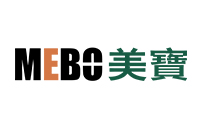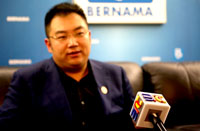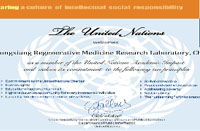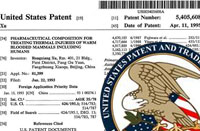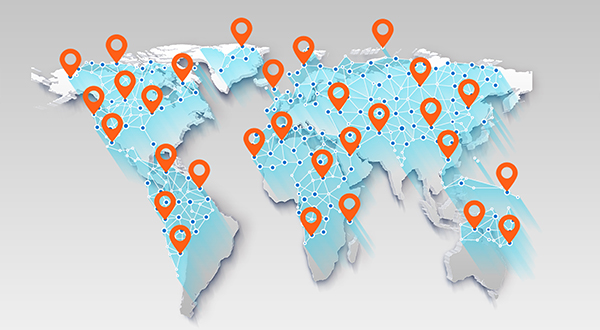Global Cooperation to Deliver Better Digital Healthcare
Good morning, distinguished APEC leaders, fellow panelists, and friends.
It is a great honor to join you here at the APEC CEO Summit 2025, and to take part in this timely dialogue on “Global Cooperation to Deliver Better Digital Healthcare.”
First, I would like to express my sincere appreciation to the Korea Chamber of Commerce and Industry, which is the Host Committee of the APEC CEO Summit, and our partners across the Asia-Pacific for convening this platform that connects ideas, industries, and innovations for a healthier, more resilient manifestation.
Part I The Core Philosophy of Digital Healthcare
At the heart of digital healthcare lies a core philosophy: everything must begin with the altruistic collection and thoughtful aggregation of data — data that comes from the frontline, from real people, real patients, and real practice.
Only when this foundation is strong can we transform that information into dynamic digital ecosystems that learn, adapt, and improve with every encounter.
Technology may be the engine, but information is the fuel— trustworthy, actionable, and rooted in reality.
When global cooperation is anchored in this philosophy, we can build a future of digital healthcare that is not only innovative, transitional, and equitable — one that delivers impact where care truly happens.
Part II – From Frontline Expertise to Dynamic Digital Ecosystems
This philosophy relies on the collective effort of MEBO’s frontline work.
Our major focus is on training the clinical workforce, especially across the APEC region, in the area of emergent care and applied regenerative treatment of burns and trauma.
Although this field represents a relatively small segment of the global healthcare industry, it reveals many of the region’s most pressing needs — from workforce shortages to inequalities in access and emergency response.
Across the Asia-Pacific, local medical experts possess deep practical knowledge from years of experience in resource-constrained conditions.
MEBO’s training model builds upon this wisdom, combining it with regenerative medicine innovations and standardized protocols to expand the capacity and resilience of local healthcare systems.
In doing so, MEBO enhances emergency and wound-care capacity, and builds the infrastructure necessary for data collection, digital evaluation, and diagnostic development — the foundational pillars of a dynamic digital healthcare ecosystem.
Together, these efforts form a cycle of empowerment— from local expertise to global knowledge sharing, from human experience to digital transformation.
Innovation in healthcare begins not in the laboratory, but on the front lines where care is delivered and lives are changed.
Part III – Regenerative Medicine: A Pathway Toward Inclusive Technological Progress
MEBO’s regenerative medical technologies, originating from the revolutionary work of Dr. Rongxiang Xu, the late founder, offer practical and affordable solutions for wound and burn care — areas often underserved in developing economies.
Yet their significance extends far beyond clinical outcomes.
In a time when the global digital transition risks leaving developing economies behind, MEBO’s approach represents a pathway toward inclusive and interconnected growth: by empowering healthcare workers through regenerative medicine and clinical training, we enable human expertise to advance in step with digital intelligence.
Each act of healing restores lives while strengthening local capacity for innovation — helping economies progress from poverty to resilience, and from manual care to human-centered, intellectual healthcare systems that leave no one behind.
Such initiative envisions an e-medical platform for wound monitoring and professional referral — powered by big data and AI.
By drawing on MEBO’s millions of clinical cases worldwide and local data, the platform standardizes wound-healing processes and provides intelligent, real-time feedback.
This platform laid one of the foundations of MEBO’s “Silver Healing” Initiative, reflecting our belief that innovation must always combine technology with compassion, and digital progress with human purpose.
Part IV – Standardization and the Optimization of Diversity
Building on these foundations, the next challenge lies in utilizing standardization while respecting local diversity.
Across the APEC region, disparities in healthcare systems and resources have led to wide variations in wound-care practices.
The APEC Briefing on Burns, convened in 2023, brought together presidents of burn associations from across APEC economies and beyond — from Asia to the Americas and Oceania — to share experiences, identify disparities, and work toward a unified framework for global burn management.
Yet, as we pursue standardization, we must also value diversity.
A treatment model succeeds only when it correlates with local circumstances — the materials, supplies, and socioeconomic status.
Experts at the Briefing discussed how regional substitutions — such as replacing active ingredients with locally sourced alternatives — can make standardized care both practical and inclusive.
With AI-driven data analysis and digital evaluation tools, we can refine these methods, ensuring consistent quality while accommodating economic and geographic differences.
This balance — standardization guided by inclusivity — defines how we build a digitally connected, human-centered health ecosystem across all 21 APEC economies.
Part V – Bridging Research and Application
The progress achieved through international exchanges reminds us that scientific collaboration alone is not enough.
Around the world — and especially in emergent care — a gap remains between research and application.
To bridge this divide, the Kevin Xu Initiative advanced the American Science Corps (ASC) — a program designed to bring science directly into society.
Much like agricultural extension services that once connected universities with farmers, ASC places young scientists within communities to conduct workshops, understand local challenges, and co-create solutions.
Part VI – Innovating Business Models, Meeting Climate Challenges, and Strengthening Global Platforms, a Global Community of Shared Future
As we look ahead, there are three strategic imperatives that may shape the future of healthcare across APEC and beyond.
Moreover, the climate crisis is intensifying natural disasters.
Latin America offers a striking example: research shows that as glaciers retreat and temperatures rise, the frequency of volcanic eruptions has increased nearly sixfold.
When the volcano erupted in Saint Vincent in 2021, MEBO responded immediately, donating 1,600 tubes of MEBO medical supplies and essential wound dressings.
Such actions reaffirm our belief that regenerative medicine and local healthcare ecosystems are not abstract ideals but practical tools for resilience in an era of escalating climate risk.
To me, the convergence of global humanitarian platforms is essential for lasting impact.
Through continuous data accumulation, cross-border communication, and synchronized training, we can transform fragmented efforts into coordinated systems — enabling faster, smarter, and more equitable responses to crises.
Within APEC and beyond, MEBO is committed to advancing this convergence — turning partnership into preparedness, and innovation into shared progress.
At Last – A Shared Future of Healing and Cooperation
In closing, our vision for digital healthcare must remain deeply human-centered.
When business innovation meets social purpose, when science connects with communities, and when nations learn from one another, progress becomes truly sustainable.
Through regenerative medicine, digital ecosystems, and global collaboration, we are not merely healing wounds — we are building trust, resilience, and shared prosperity.
Let us continue working together — across borders, sectors, and generations — to create a future of healthcare that empowers, includes, and grows for all.
Thank you.
About MEBO
Founded in 1987 by Professor Rongxiang Xu, a distinguished Chinese life scientist, MEBO Group is a multinational headquartered in both China and the USA. It integrates research, development, and sales across the pharmaceuticals, medical devices, health foods, and cosmetics sectors.
At its core, MEBO focuses on regenerative life sciences, innovating with over 100 patents and more than ten joint research bases to enhance and enable the body's own regenerative abilities.
As a leader in regenerative life science, MEBO's extensive research facilities and products impact over 100 countries globally, pioneering new frontiers in the regenerative life world.


